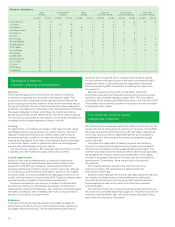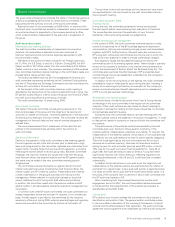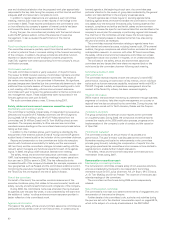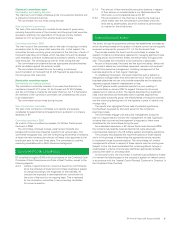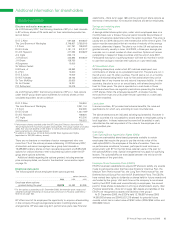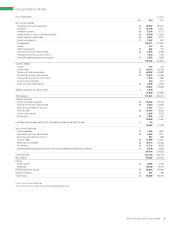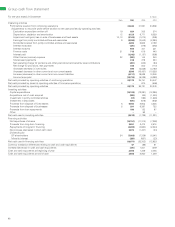BP 2006 Annual Report Download - page 90
Download and view the complete annual report
Please find page 90 of the 2006 BP annual report below. You can navigate through the pages in the report by either clicking on the pages listed below, or by using the keyword search tool below to find specific information within the annual report.
88
Record holders of BP ADSs also are entitled to attend, speak and vote
at any shareholders’ meeting of BP by the appointment by the approved
depositary, JPMorgan Chase Bank, of them as proxies in respect of the
ordinary shares represented by their ADSs. Each such proxy may also
appoint a proxy. Alternatively, holders of ADSs are entitled to vote
by supplying their voting instructions to the depositary, who will vote
the ordinary shares represented by their ADSs in accordance with
their instructions.
Proxies may be delivered electronically.
Matters are transacted at shareholders’ meetings by the proposing
and passing of resolutions, of which there are three types: ordinary,
special or extraordinary.
An ordinary resolution requires the affirmative vote of a majority of the
votes of those persons voting at a meeting at which there is a quorum.
Special and extraordinary resolutions require the affirmative vote of not
less than three-fourths of the persons voting at a meeting at which there
is a quorum. Any AGM at which it is proposed to put a special or ordinary
resolution requires 21 days’ notice. An extraordinary resolution put to the
AGM requires no notice period. Any extraordinary general meeting at
which it is proposed to put a special resolution requires 21 days’ notice;
otherwise, the notice period for an extraordinary general meeting is
14 days.
Liquidation rights; redemption provisions
In the event of a liquidation of BP, after payment of all liabilities and
applicable deductions under UK laws and subject to the payment of
secured creditors, the holders of BP preference shares would be entitled
to the sum of (i) the capital paid up on such shares plus, (ii) accrued and
unpaid dividends and (iii) a premium equal to the higher of (a) 10% of the
capital paid up on the BP preference shares and (b) the excess of the
average market price over par value of such shares on the LSE during
the previous six months. The remaining assets (if any) would be divided
pro rata among the holders of ordinary shares.
Without prejudice to any special rights previously conferred on the
holders of any class of shares, BP may issue any share with such
preferred, deferred or other special rights, or subject to such restrictions
as the shareholders by resolution determine (or, in the absence of any
such resolutions, by determination of the directors), and may issue shares
that are to be or may be redeemed.
Variation of rights
The rights attached to any class of shares may be varied with the consent
in writing of holders of 75% of the shares of that class or upon the
adoption of an extraordinary resolution passed at a separate meeting of
the holders of the shares of that class. At every such separate meeting,
all of the provisions of the Articles of Association relating to proceedings
at a general meeting apply, except that the quorum with respect to a
meeting to change the rights attached to the preference shares is 10%
or more of the shares of that class, and the quorum to change the rights
attached to the ordinary shares is one third or more of the shares of
that class.
Shareholders’ meetings and notices
Shareholders must provide BP with a postal or electronic address in the
UK in order to be entitled to receive notice of shareholders’ meetings.
In certain circumstances, BP may give notices to shareholders by
advertisement in UK newspapers. Holders of BP ADSs are entitled to
receive notices under the terms of the deposit agreement relating to BP
ADSs. The substance and timing of notices is described above under the
heading Voting Rights.
Under the Articles of Association, the AGM of shareholders will be held
within 15 months after the preceding AGM. All other general meetings of
shareholders shall be called extraordinary general meetings and all general
meetings shall be held at a time and place determined by the directors
within the UK. If any shareholders’ meeting is adjourned for lack of
quorum, notice of the time and place of the meeting may be given in any
lawful manner, including electronically. Powers exist for action to be taken
either before or at the meeting by authorized officers to ensure its orderly
conduct and safety of those attending.
Limitations on voting and shareholding
There are no limitations imposed by English law or BP’s Memorandum or
Articles of Association on the right of non-residents or foreign persons to
hold or vote the company’s ordinary shares or ADSs, other than
limitations that would generally apply to all of the shareholders.
Disclosure of interests in shares
The UK Companies Act permits a public company, on written notice, to
require any person whom the company believes to be or, at any time
during the previous three years prior to the issue of the notice, to have
been interested in its voting shares, to disclose certain information with
respect to those interests. Failure to supply the information required may
lead to disenfranchisement of the relevant shares and a prohibition on
their transfer and receipt of dividends and other payments in respect of
those shares. In this context the term ‘interest’ is widely defined and will
generally include an interest of any kind whatsoever in voting shares,
including any interest of a holder of BP ADSs.
Exchange controls
There are currently no UK foreign exchange controls or restrictions on
remittances of dividends on the ordinary shares or on the conduct of the
company’s operations.
There are no limitations, either under the laws of the UK or under BP’s
Articles of Association, restricting the right of non-resident or foreign
owners to hold or vote BP ordinary or preference shares in the company.
Taxation
This section describes the material US federal income tax and UK taxation
consequences of owning ordinary shares or ADSs to a US holder who
holds the ordinary shares or ADSs as capital assets for tax purposes.
It does not apply, however, to members of special classes of holders
subject to special rules and holders that, directly or indirectly, hold 10%
or more of the company’s voting stock.
A US holder is any beneficial owner of ordinary shares or ADSs that
is for US federal income tax purposes (i) a citizen or resident of the US,
(ii) a US domestic corporation, (iii) an estate whose income is subject to
US federal income taxation regardless of its source, or (iv) a trust if a
US court can exercise primary supervision over the trust’s administration
and one or more US persons are authorized to control all substantial
decisions of the trust.
This section is based on the Internal Revenue Code of 1986, as
amended, its legislative history, existing and proposed regulations
thereunder, published rulings and court decisions, and the taxation laws
of the UK, all as currently in effect, as well as the income tax convention
between the US and the UK that entered into force on 31 March 2003
(the Treaty). These laws are subject to change, possibly on a retroactive
basis.
For purposes of the Treaty and the estate and gift tax Convention (the
‘Estate Tax Convention’), and for US federal income tax and UK taxation
purposes, a holder of ADRs evidencing ADSs will be treated as the owner
of the company’s ordinary shares represented by those ADRs. Exchanges
of ordinary shares for ADRs and ADRs for ordinary shares generally will
not be subject to US federal income tax or to UK taxation other than
stamp duty or stamp duty reserve tax, as described below.
This section is further based in part upon the representations of the
Depositary and assumes that each obligation in the Deposit Agreement
and any related agreement will be performed in accordance with its terms.
Investors should consult their own tax adviser regarding the US federal,
state and local, the UK and other tax consequences of owning and
disposing of ordinary shares and ADSs in their particular circumstances,
and in particular whether they are eligible for the benefits of the Treaty.


